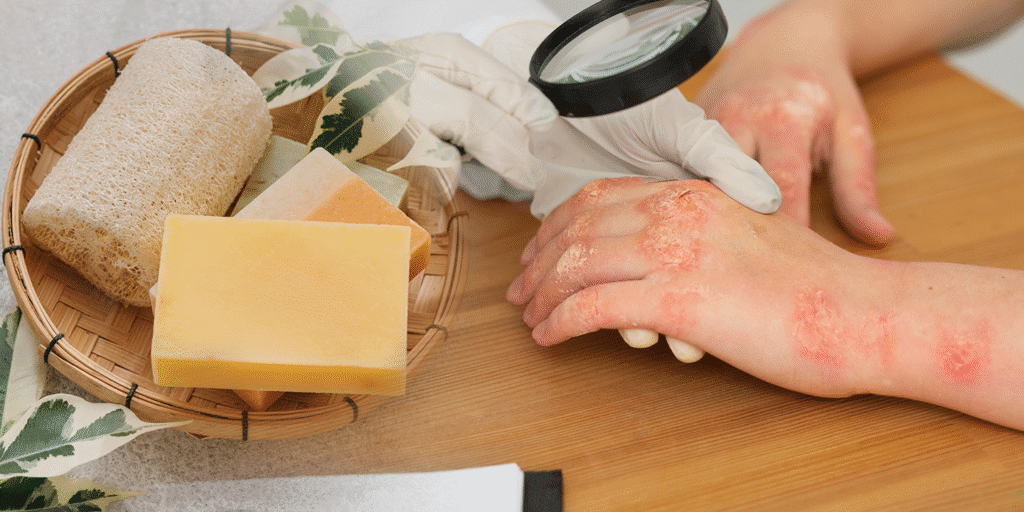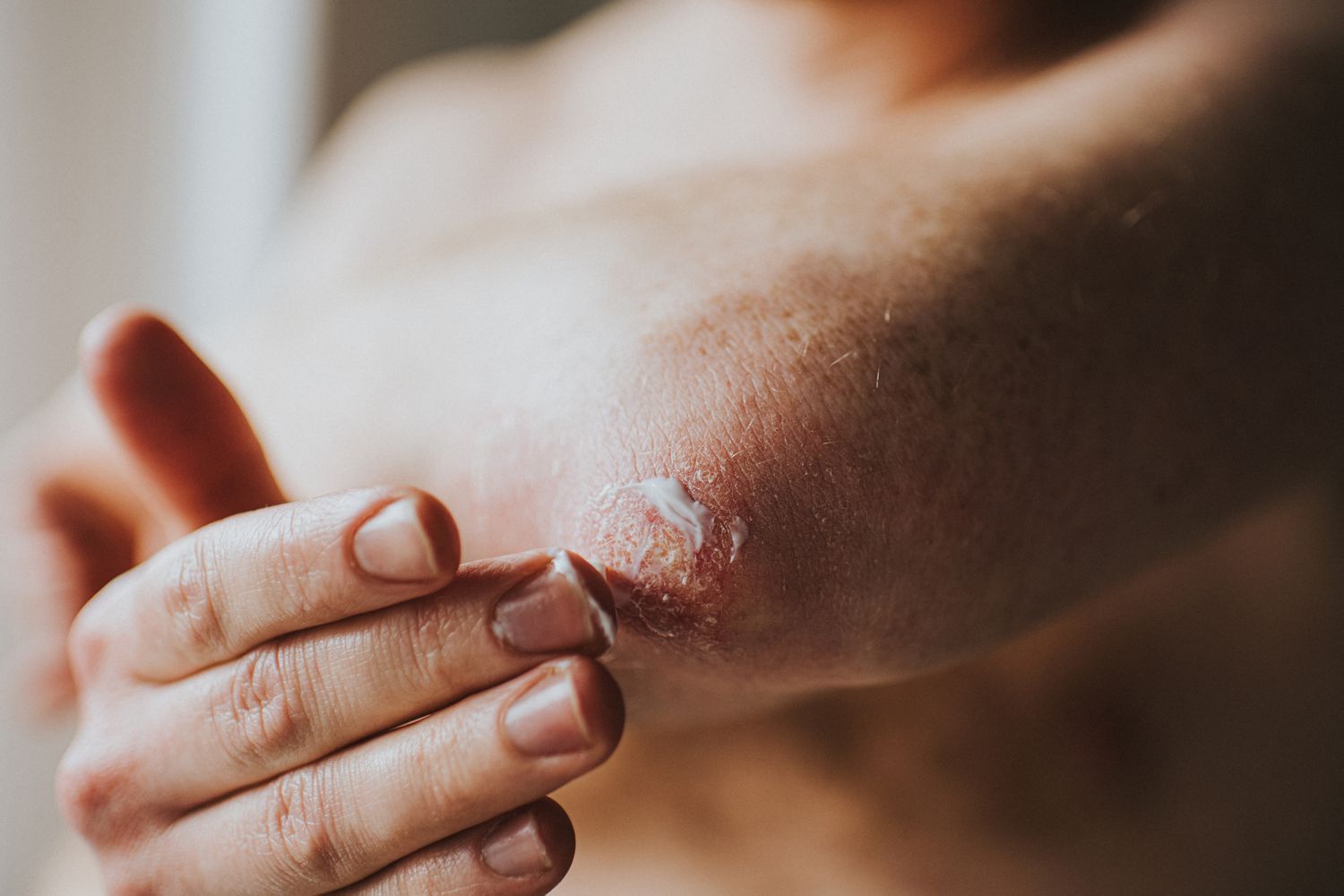Psoriasis is a chronic skin condition that leads to the rapid growth of skin cells, causing patches of thick, inflamed skin. Managing psoriasis involves understanding the importance of proper skin care, identifying triggers, and applying effective treatments. In this guide, we explore the key aspects of psoriasis, from its symptoms and causes to essential skin care tips that can help soothe your skin.
Location of Psoriasis
Psoriasis can appear in various parts of the body, including:
- Scalp
- Elbows
- Knees
- Lower back
Understanding where psoriasis typically manifests is the first step in managing the condition effectively.
Symptoms of Psoriasis
Common symptoms of psoriasis include:
- Red, raised patches with silvery scales
- Dry, cracked skin that may bleed
- Itching, burning, or soreness
- Thickened nails with ridges or pits
- Swollen or stiff joints, particularly in psoriatic arthritis
These symptoms can range from mild to severe, often causing discomfort or pain.
Causes & Risk Factors
While the exact cause of psoriasis is unknown, several factors can contribute to its development:
- Genetic predisposition (family history of psoriasis)
- Immune system malfunction, where overactive immune cells attack healthy skin
- Environmental triggers like stress, infections, or skin injuries
- Lifestyle factors, such as smoking and heavy alcohol consumption
Understanding these causes can help in managing flare-ups and avoiding certain triggers.
Diagnosis of Psoriasis
Psoriasis is usually diagnosed by a dermatologist through a physical examination of the skin. In some cases, a skin biopsy may be recommended to confirm the diagnosis.
Related Conditions
Psoriasis is often associated with several other health conditions, including:
- Psoriatic arthritis (joint inflammation)
- Eczema (atopic dermatitis)
- Seborrheic dermatitis (scaly red patches on the scalp)
- Rheumatoid arthritis
These conditions may overlap, requiring special care in treatment and management.
Diet for Psoriasis
A healthy diet can play a significant role in managing psoriasis. Consider including:
- Anti-inflammatory foods like fruits, vegetables, and omega-3-rich fish
- Avoiding processed foods, alcohol, and red meats, which can exacerbate inflammation
Treatment of Psoriasis
Treatment options vary based on the severity of the condition and include:
- Topical treatments such as corticosteroids, Vitamin D analogs, or retinoids
- Phototherapy (light therapy) for moderate to severe cases
- Systemic treatments, including oral medications or biologics for severe cases
Always consult your dermatologist to determine the best treatment for your skin type and condition.
Prevention of Psoriasis Flare-ups
To reduce the frequency and severity of psoriasis flare-ups:
- Avoid known triggers such as infections or skin trauma
- Moisturize regularly using gentle, non-irritating products
- Adopt a healthy lifestyle that includes stress management, exercise, and a balanced diet
Learn more about the latest psoriasis research and treatment options in this NIH guide to psoriasis.
Home Remedies for Psoriasis
In addition to medical treatments, certain home remedies can help soothe psoriasis symptoms:
- Epsom salt baths to reduce scaling and inflammation
- Coconut oil for moisturizing
- Aloe vera gel to calm inflamed skin
- Oatmeal baths for itching relief
These remedies provide temporary relief, but always consult your doctor if your symptoms worsen.
Types of Psoriasis

There are several different types of psoriasis, each with unique characteristics:
- Plaque psoriasis: The most common type, characterized by raised red patches with silvery scales
- Guttate psoriasis: Small, drop-shaped spots, often triggered by infections
- Inverse psoriasis: Smooth, red patches that appear in skin folds
- Pustular psoriasis: White pustules surrounded by red skin
- Erythrodermic psoriasis: Severe form causing widespread redness and skin shedding
Each type may require different treatment approaches, so it’s important to get an accurate diagnosis.
Prognosis of Psoriasis
While psoriasis is a chronic condition, effective treatments can significantly reduce symptoms and improve quality of life. Early diagnosis, regular skin care, and tailored treatment plans are crucial to managing the condition long-term.
A Beginner’s Guide to Caring for Your Skin with Psoriasis
Caring for your skin is essential to managing psoriasis effectively. A well-structured skincare routine helps reduce inflammation, pain, and itching caused by psoriasis.
Why Skin Care Matters for Psoriasis
Psoriasis often leads to dry, itchy, and painful skin. Disruptions in the skin barrier can make the skin hypersensitive and more prone to irritation. Therefore, choosing the right skin care routine is vital for maintaining skin health and preventing flare-ups.
What to Avoid in Your Skincare Routine
Routine Activities to Avoid:
- Long, hot showers (Keep showers under 10 minutes and use warm water)
- Vigorous scrubbing (Use your hands instead of scrubs or washcloths)
- Shaving with dull blades or excessive pressure
- Frequent hair removal, including shaving, waxing, and tweezing
Ingredients to Avoid:
- Fragrances
- Alcohol
- Sodium lauryl sulfate
- Ammonium lauryl sulfate
These ingredients can dry out the skin or cause irritation, worsening psoriasis symptoms. Always read labels and avoid products that may aggravate your skin.
What to Add to Your Psoriasis Skin Care Routine
Moisturizers
Moisturizing throughout the day helps maintain hydration. Consider fragrance-free, thick moisturizers to keep skin soft and prevent dryness. For more recommendations,.
Sunscreen
Use a broad-spectrum sunscreen with SPF 30 or higher to protect your skin from UV damage. Sunscreen also helps prevent further irritation from sunburns, which can trigger flare-ups.
Urea Creams
Urea-based products help maintain moisture and exfoliate dead skin cells, promoting smoother skin and reducing psoriasis plaques.
Shampoos for Scalp Psoriasis
For scalp psoriasis, use medicated shampoos containing coal tar to slow the rapid growth of skin cells and reduce inflammation. Your dermatologist may prescribe a specific shampoo for your condition.
Psoriasis Skincare Routine

Morning Routine:
- Wash with a gentle, fragrance-free cleanser.
- Apply any prescribed medications.
- Use a moisturizer.
- Apply a sunscreen with SPF 30 or higher.
Evening Routine:
- Wash with a gentle cleanser.
- Apply prescribed treatments.
- Use a thick layer of moisturizer.
Showering Tips:
- Limit showers to under 10 minutes with warm water.
- Use a gentle body wash.
- If shaving, use a moisturizing lotion or cream instead of soap.
Takeaway
Psoriasis is a lifelong condition, but with the right skincare routine, you can effectively manage symptoms. Moisturizing, avoiding triggers, and using the right products can make a significant difference in your skin’s health. Always consult your dermatologist to customize your skincare routine.
Also Read : Best Ingredients for Anti-Aging Skincare: What Really Works



